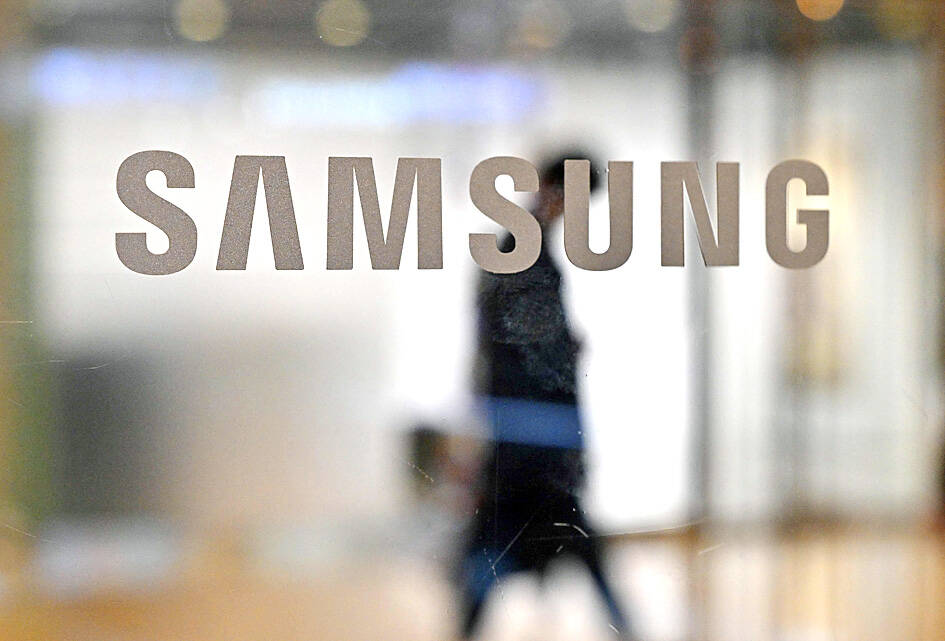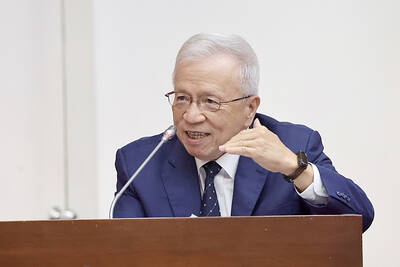Samsung Electronics Co is to build a new semiconductor chip development facility in Japan, Japan’s Nihon Keizai Shimbun reported.
The plant would be in Yokohama, where Samsung has a research and development site, the report said, without citing anyone.
The South Korean firm would build a production line for a prototype chip, and the facility would cost more than ¥30 billion (US$221 million), with the Japanese government expected to provide more than ¥10 billion in subsidies, it said.

Photo: AFP
Operations are targeted to begin in 2025, it reported.
Samsung’s move follows its bigger foundry rival Taiwan Semiconductor Manufacturing Co (TSMC, 台積電), which is building a plant in Japan’s Kumamoto Prefecture for its 12-nanometer, 16-nanometer and 22-nanometer processes, as well as 28-nanometer specialty technology, with commercial production expected to start next year.
TSMC is building the plant through Japan Advanced Semiconductor Manufacturing Inc, a joint venture with Sony Semiconductor Solution Corp and Denso Corp.
Relations between Japan and South Korea are improving, with their leaders visiting each other’s nations and agreeing to cooperate on chips and security.
The Japanese government has also been signaling support for semiconductor and battery projects as it tries to bolster its supply chain for the key products. Japan would provide subsidies for eight battery and two semiconductor projects, Japanese Minister of Economy, Trade and Industry Yasutoshi Nishimura said last month.
Separately, Samsung executive chairman Jay Y. Lee and Tesla Inc chief executive officer Elon Musk met in the US last week, South Korea’s Yonhap news agency reported.
Lee and Musk held the meeting at Samsung’s semiconductor research center in Silicon Valley, California, on Wednesday, Yonhap said yesterday.
The two companies are looking at possibly joining forces to develop chips for fully autonomous vehicles among other things, the report cited people in the industry as saying.
The global market for automotive chips is expected to rise to US$400 billion by next year, and to jump to US$700 billion by 2028, Yonhap said, citing Strategic Analytics and Research and Markets.
Lee wrapped up his 22-day visit to the US on Friday, after a series of meetings with other business leaders including Microsoft Corp CEO Satya Nadella and Google CEO Sundar Pichai, the report said.
The meeting was Lee’s first private one with Musk, Yonhap said.
Additional reporting by CNA

JITTERS: Nexperia has a 20 percent market share for chips powering simpler features such as window controls, and changing supply chains could take years European carmakers are looking into ways to scratch components made with parts from China, spooked by deepening geopolitical spats playing out through chipmaker Nexperia BV and Beijing’s export controls on rare earths. To protect operations from trade ructions, several automakers are pushing major suppliers to find permanent alternatives to Chinese semiconductors, people familiar with the matter said. The industry is considering broader changes to its supply chain to adapt to shifting geopolitics, Europe’s main suppliers lobby CLEPA head Matthias Zink said. “We had some indications already — questions like: ‘How can you supply me without this dependency on China?’” Zink, who also

At least US$50 million for the freedom of an Emirati sheikh: That is the king’s ransom paid two weeks ago to militants linked to al-Qaeda who are pushing to topple the Malian government and impose Islamic law. Alongside a crippling fuel blockade, the Group for the Support of Islam and Muslims (JNIM) has made kidnapping wealthy foreigners for a ransom a pillar of its strategy of “economic jihad.” Its goal: Oust the junta, which has struggled to contain Mali’s decade-long insurgency since taking power following back-to-back coups in 2020 and 2021, by scaring away investors and paralyzing the west African country’s economy.

BUST FEARS: While a KMT legislator asked if an AI bubble could affect Taiwan, the DGBAS minister said the sector appears on track to continue growing The local property market has cooled down moderately following a series of credit control measures designed to contain speculation, the central bank said yesterday, while remaining tight-lipped about potential rule relaxations. Lawmakers in a meeting of the legislature’s Finance Committee voiced concerns to central bank officials that the credit control measures have adversely affected the government’s tax income and small and medium-sized property developers, with limited positive effects. Housing prices have been climbing since 2016, even when the central bank imposed its first set of control measures in 2020, Chinese Nationalist Party (KMT) Legislator Lo Ting-wei (羅廷瑋) said. “Since the second half of

AI BOOST: Next year, the cloud and networking product business is expected to remain a key revenue pillar for the company, Hon Hai chairman Young Liu said Manufacturing giant Hon Hai Precision Industry Co (鴻海精密) yesterday posted its best third-quarter profit in the company’s history, backed by strong demand for artificial intelligence (AI) servers. Net profit expanded 17 percent annually to NT$57.67 billion (US$1.86 billion) from NT$44.36 billion, the company said. On a quarterly basis, net profit soared 30 percent from NT$44.36 billion, it said. Hon Hai, which is Apple Inc’s primary iPhone assembler and makes servers powered by Nvidia Corp’s AI accelerators, said earnings per share expanded to NT$4.15 from NT$3.55 a year earlier and NT$3.19 in the second quarter. Gross margin improved to 6.35 percent,